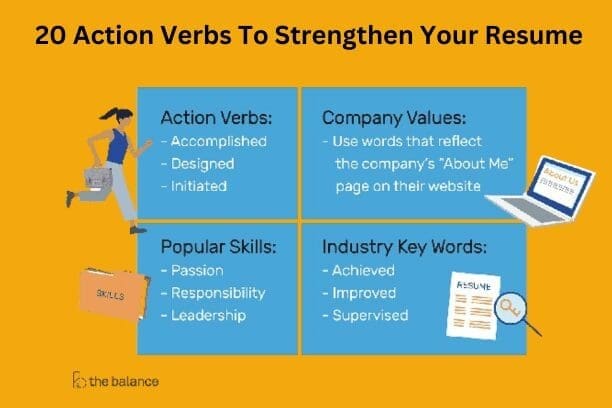Have you ever wondered how to make your resume stand out? A resume that grabs the attention of the hiring manager? The secret lies in the choice of words. Action verbs are powerful words that don’t just describe your experience; they breathe life into it. They transform your resume into a powerful tool that catches the eye of recruiters and leaves a lasting impact.
This guide you will learn:
- How to strategically use action verbs in your resume
- Examples of action verbs in different sections of a resume
- 4 common mistakes to avoid
What Are Action Verbs?
Action verbs are the superheroes of resume writing. They are words that breathe life into your accomplishments, making your resume more compelling and engaging. Instead of merely listing your tasks, action verbs describe what you did and how you did it, giving potential employers a vivid picture of your capabilities.
Why Are Action Verbs Are Important in Your Resume?
Picture this: a recruiter skimming through a pile of resumes. Action verbs act as beacons, guiding the recruiter’s attention to your achievements and responsibilities. They bring clarity and energy to your resume, helping you stand out in a sea of applicants. Action verbs aren’t just words; they’re the driving force behind a resume that leaves a lasting impression.
How to Use Action Verbs in Your Resume:
Be Specific and Concise:
Instead of saying “Managed a team,” opt for “Led a cross-functional team of 10 members.”
The example above not only communicates leadership skills you possess but also specifies the team’s structure and size. This level of detail not only paints a clearer picture for recruiters but also conveys a sense of precision and effectiveness. Every word on your resume should serve a purpose, and by opting for specificity, you ensure that your achievements are not only acknowledged but resonate with the hiring manager looking for candidates with a tangible impact.
2. Tailor to the Job Description:
Customize your action verbs to match the keywords in the job description. If they’re looking for someone with “innovative problem-solving skills,” showcase how you “pioneered creative solutions.”
Related: How to tailor your resume for different job applications in 2024
3. Highlight Achievements:
Use action verbs to emphasize your accomplishments. For instance, change “Contributed to sales growth” to “Drove a 20% increase in sales.”
Related: How do I highlight my key achievements in a resume?
4. Showcase Leadership:
Incorporate dynamic action verbs like “Directed,” “Guided,” or “Championed” to vividly illustrate your leadership prowess. For instance, if you successfully spearheaded a team project, you might say, “Championed a cross-functional team to execute a high-impact project, resulting in a 25% increase in overall efficiency.” This not only highlights your leadership role but also quantifies the impact, providing concrete evidence of your ability to drive positive outcomes. Employers are keen on tangible results, so pairing leadership verbs with specific achievements strengthens your resume and underscores your capacity to lead and deliver results..”
5. Vary Your Vocabulary:
One key to crafting a standout resume is the deliberate choice of action verbs. Instead of relying on the same repetitive terms, consider diversifying your vocabulary to breathe life into your professional narrative. By incorporating a variety of action verbs, you not only steer clear of monotony but also demonstrate versatility and a dynamic approach to your work.
For instance, if you’ve frequently used “managed” in your previous roles, explore alternatives such as “oversaw,” “orchestrated,” or “directed” to convey a nuanced sense of leadership. Similarly, replace commonplace terms like “completed” with more impactful alternatives like “executed,” “achieved,” or “fulfilled” to highlight your accomplishments with precision.
6. Quantify Where Possible:
Attach numbers to your achievements for impact. Instead of saying “Improved efficiency,” say “Boosted efficiency by 30%.”
Related: 7 Best Ways To Showcase Your Skills In A Resume
Examples of Action Verbs in Different Sections:
Work Experience: Examples
- Engineered a process optimization project, reducing turnaround time by 30%.
- Directed a cross-functional team to implement a new software solution, improving operational efficiency by 20%.
- Piloted a training program, enhancing employee productivity and reducing errors by 15%.
- Innovated a cost-saving strategy, resulting in a 25% reduction in expenses.
- Administered a client retention initiative, boosting customer loyalty and increasing repeat business by 20%.
- Managed the launch of a new product line, contributing to a 35% increase in overall sales.
- Coordinated a rebranding effort, elevating brand visibility and recognition by 30%.
- Oversaw the execution of a community outreach program, strengthening corporate social responsibility and community engagement.
Achievements:
- Piloted a market research initiative, identifying new opportunities that led to a 25% increase in sales.
- Devised and implemented a customer feedback system, resulting in a 30% improvement in overall satisfaction.
- Instituted a streamlined onboarding process, reducing new employee training time by 40%.
- Championed a sustainability project, achieving a 20% reduction in the company’s carbon footprint.
- Executed a successful rebranding campaign, elevating brand visibility and increasing market share by 15%.
- Introduced a new project management software, optimizing workflow efficiency and reducing project timelines by 25%.
- Supervised the implementation of a quality control system, decreasing product defects by 18%.
- Administered a cross-functional collaboration initiative, fostering teamwork and reducing project completion times by 30%.
Common Mistakes to Avoid:
- Using Passive Language:
- Passive phrases like “Responsible for” or “Duties included” can make your resume seem dull. Opt for active, engaging verbs.
- Overusing the Same Verbs:
- Repeating the same action verbs can bore the reader. Keep your resume lively by incorporating a mix of dynamic words.
- Neglecting Specificity:
- Vague terms like “Handled” or “Managed” lack impact. Be specific about your contributions and responsibilities.
Related What are some common resume mistakes to avoid?
Benefits of Using Action Verbs in your resume
- Enhanced Readability:
- Action verbs break the monotony and create a dynamic flow, making your resume more enjoyable to read.
- Increased Impact:
- They add punch to your achievements, ensuring they leave a lasting impression on recruiters.
- Improved ATS Compatibility:
- Many Applicant Tracking Systems (ATS) are designed to respond positively to action verbs, increasing your chances of passing the initial screening.
Do you want a powerful resume that will land you a job? A resume that tells your unique story, using compelling action verbs? Order Here.







